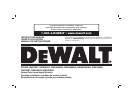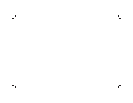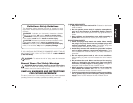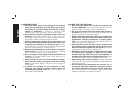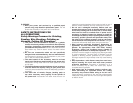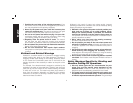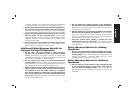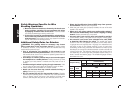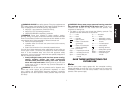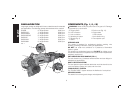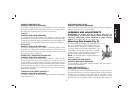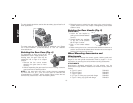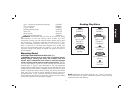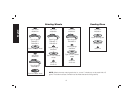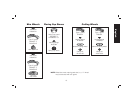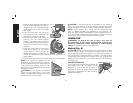
to protect operator from broken wheel fragments, accidental
contact with wheel , and sparks that could ignite clothing.
c) Wheels must be used only for recommended applications.
For example: do not grind with the side of cut-off wheel.
Abrasive cut-off wheels are intended for peripheral grinding,
side forces applied to these wheels may cause them to shatter.
d
)
Always use undamaged wheel flanges that are of correct
size and shape for your selected wheel. Proper wheel
flanges support the wheel thus reducing the possibility of wheel
breakage. Flanges for cut-off wheels may be different from
grinding wheel flanges.
e) Do not use worn down wheels from larger power tools.
Wheel intended for larger power tool is not suitable for the
higher speed of a smaller tool and may burst.
Additional Safety Warnings Specifi c for
Abrasive Cutting-Off Operations
a) Do not “jam” the cut-off wheel or apply excessive
pressure. Do not attempt to make an excessive depth
of cut. Overstressing the wheel increases the loading and
susceptibility to twisting or binding of the wheel in the cut and
the possibility of kickback or wheel breakage.
b) Do not position your body in line with and behind the
rotating wheel. When the wheel, at the point of operation, is
moving away from your body, the possible kickback may propel
the spinning wheel and the power tool directly at you.
c) When wheel is binding or when interrupting a cut for any
reason, switch off the power tool and hold the power
tool motionless until the wheel comes to a complete
stop. Never attempt to remove the cut-off wheel from
the cut while the wheel is in motion otherwise kickback
may occur. Investigate and take corrective action to eliminate
the cause of wheel binding.
d
)
Do not restart the cutting operation in the workpiece.
Let the wheel reach full speed and carefully reenter the
cut. The wheel may bind, walk up or kickback if the power tool
is restarted in the workpiece.
e) Support panels or any oversized workpiece to minimize
the risk of wheel pinching and kickback. Large workpieces
tend to sag under their own weight. Supports must be placed
under the workpiece near the line of cut and near the edge of
the workpiece on both sides of the wheel.
f
)
Use extra caution when making a “pocket cut” into
existing walls or other blind areas. The protruding wheel
may cut gas or water pipes, electrical wiring or objects that can
cause kickback.
Safety Warnings Specifi c for Sanding
Operations
a) Do not use excessively oversized sanding disc paper.
Follow manufacturer's recommendations when selecting
sanding paper. Larger sanding paper extending beyond the
sanding pad presents a laceration hazard and may cause
snagging, tearing of the disc or kickback.
Safety Warnings Specifi c for Polishing
Operations
a) Do not allow any loose portion of the polishing bonnet
or its attachment strings to spin freely. Tuck away or
trim any loose attachment strings. Loose and spinning
attachment strings can entangle your fingers or snag on the
workpiece.
English
5



